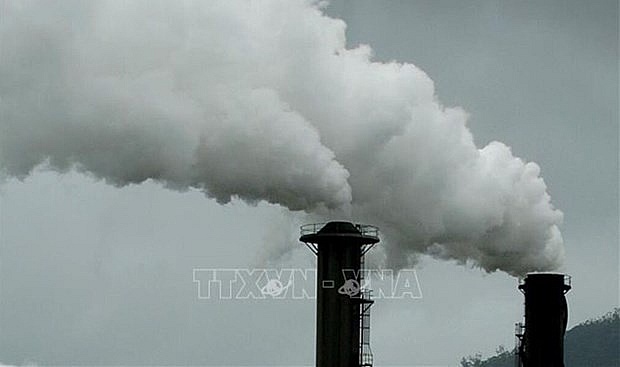Vietnam makes efforts to develop domestic carbon market
 |
| Vietnam makes efforts to develop domestic carbon market, Illustrative image (Source: AFP/VNA) |
Hanoi – In the context that about 70 countries and territories have applied carbon pricing instruments, experts held that Vietnam should also apply such tools, especially by developing the domestic carbon market, in order to support the realisation of the country’s greenhouse gas (GHG) emissions reduction target.
Following the Paris Climate Accords, Vietnam must fulfill its mandatory obligation to reduce greenhouse gas emissions from 2021 according to the Nationally Determined Contribution (NDC). The country also needs to make efforts to reduce GHG emissions towards the goal of net-zero emissions by 2050.
Statistics show that carbon pricing tools control about 23 per cent of total global emissions in 2023.
In Vietnam, the voluntary exchange of carbon credits with the world has been carried out by businesses since the mid-2000s in projects and programmes under the Clean Development Mechanism (CDM) - a United Nations-run carbon offset scheme allowing countries to fund GHG emissions-reducing projects in other countries and claim the saved emissions as part of their own efforts to meet international emissions targets.
Data from the Department of Climate Change (DCC) under the Ministry of Natural Resources and Environment show that to date, more than 300 programmes and projects have registered to be implemented with carbon credit mechanisms. Of these, about 150 programmes and projects were granted more than 40.2 million carbon credits which have been exchanged on the world carbon market.
According to the Government’s Decree 06/2022/ND-CP on the roadmap for the domestic carbon market development, until 2027, Vietnam will implement a number of activities such as developing regulations for carbon credit management, exchanging greenhouse gas emission quotas and carbon credits, building regulations for operating the carbon credit exchange, and piloting the carbon credit exchange and offset mechanism in potential areas and guiding the implementation of the domestic and international carbon credit exchange and offset mechanism in accordance with the provisions of law international treaty to which Vietnam is a member.
At the same time, Vietnam will pilot a carbon credit exchange from 2025, and implement capacity building activities and raise public awareness of carbon market development.
DCC Vice Director Mai Kim Lien said that along with coordinating with relevant agencies to build policies in the field, the department has worked with specialised agencies to collect data on GHG emissions serving the allocation of GHG emission quota, while holding activities to raise awareness of the carbon market among officials, public workers and businesses in many localities across the country. A national registration system will be set up to manage all carbon credits generated in the territory of Vietnam, she added.
 | Leveraging carbon markets for Vietnam’s climate commitments Vietnam has identified the importance of shifting away from traditional models of growth in order to sustain the development gains of recent decades. The country adopted its National Green Growth Strategy in 2021 and developed the Green Growth Action Plan the following year. In 2021, Vietnam made a commitment to bring net emissions to zero by the middle of the century. |
 | Defining the crucial role for voluntary carbon markets With 2030 not that far away, if nations and companies are to accelerate towards their net-zero targets, voluntary carbon markets have an essential part to play. |
What the stars mean:
★ Poor ★ ★ Promising ★★★ Good ★★★★ Very good ★★★★★ Exceptional
Related Contents
Latest News
More News
- Trung Nam-Sideros River consortium wins bid for LNG venture (January 30, 2026 | 11:16)
- Vietnam moves towards market-based fuel management with E10 rollout (January 30, 2026 | 11:10)
- Envision Energy, REE Group partner on 128MW wind projects (January 30, 2026 | 10:58)
- Vingroup consults on carbon credits for electric vehicle charging network (January 28, 2026 | 11:04)
- Bac Ai Pumped Storage Hydropower Plant to enter peak construction phase (January 27, 2026 | 08:00)
- ASEAN could scale up sustainable aviation fuel by 2050 (January 24, 2026 | 10:19)
- 64,000 hectares of sea allocated for offshore wind surveys (January 22, 2026 | 20:23)
- EVN secures financing for Quang Trach II LNG power plant (January 17, 2026 | 15:55)
- PC1 teams up with DENZAI on regional wind projects (January 16, 2026 | 21:18)
- Innovation and ESG practices drive green transition in the digital era (January 16, 2026 | 16:51)

 Tag:
Tag:

















 Mobile Version
Mobile Version